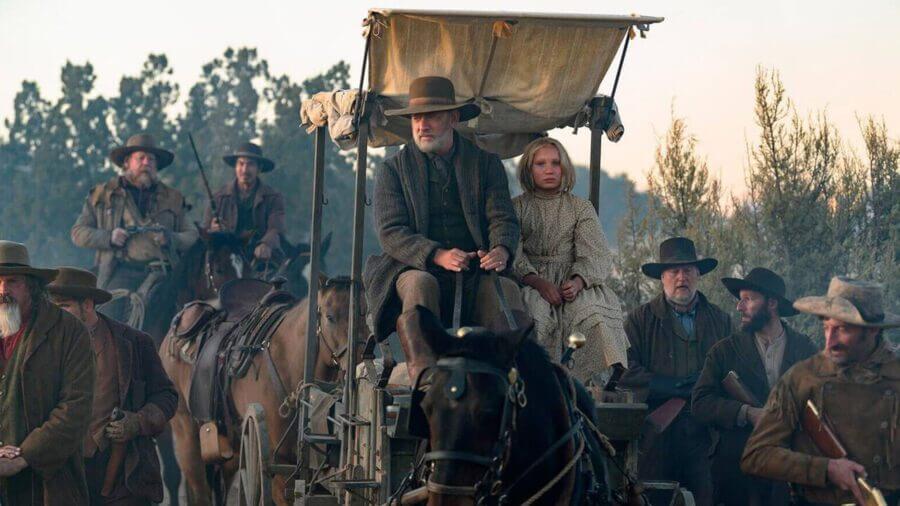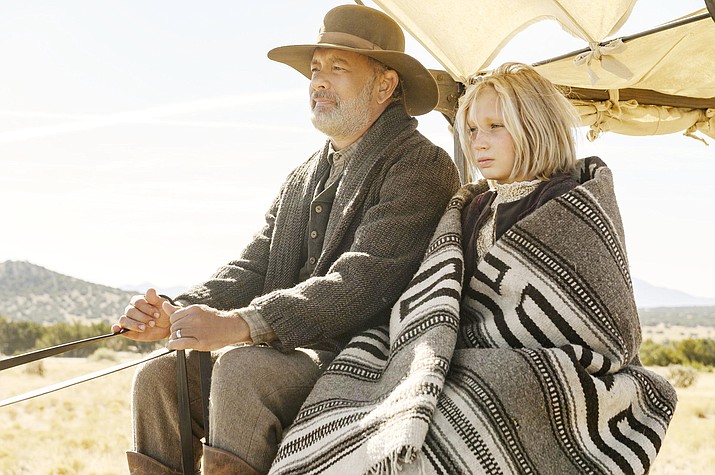These days, if you want to see what’s going on worldwide, you just have to turn on CNN, MSNBC, or even YouTube. For those in 1870, that wasn’t the case. You had to wait until Tom Hanks would come through your small Texas farm town on horseback and read a selection of articles aloud for just a mere 10 cents.
News of the World, an interesting, but slightly confusing and plot-hole ridden western directed by Oscar-Nominated filmmaker, Paul Greengrass, and based on the novel of the same name by Paulette Jiles, follows the extremely talented Tom Hanks, who plays a Civil war veteran during a heavily divided and problematic time, five years after the Civil War. This isn’t the first time Hank and Greengrass have teamed up. They have worked together on the 6 time Oscar Nominated film, Captain Phillips, which is very different from News of the World making this film a clear departure from their normal genres. Greengrass, having directed many ripped-from-the-headlines type thrillers, a western is a sharp turn for him. For Hanks, this is his first go around starring in a western film.

The film follows Hanks as Captain Jefferson Kyle Kidd, a kind, empathetic, enigma of a man who goes town to town on horseback, reading headlines from a selection of newspapers countrywide. In an early scene, he says he loves to help people escape from their sad lives by telling stories, which doesn’t entirely make sense since the “stories” he’s telling are even more depressing than the people listening to them. This moment launches a series of strange and baffling moments similar to that one.
While on a trip to reach another town for his news-reading, his plans change entirely when he finds a young native American girl named Johanna, whom he aggressively runs after and catches her as if he’s catching a dog who ran into the street. Moments later, a group of patrolmen come through and tell Hanks to take the girl into town to see some sort of agent that will take the girl to relatives safe and sound. He reluctantly does so, but once he arrives in the supposed town, the agent isn’t there and won’t be for another three months. He can’t wait that long. He has work to do and places to be, but his moral compass won’t let him just leave Johanna so he takes her with him. Thus begins a long and winding journey across the empty planes of Texas to bring Johanna home safe.

Hanks plays Kidd with a very kind and calming manner who always puts others before himself and tries to do the right thing, which isn’t far from other characters he’s played like Captain Richard Phillips, Chesley “Sully” Sullenberger, and Mr. Rogers. While Hanks plays Captain Kidd to a perfect tee and everyone else sinks below him given his clear, smart and calming presence in an intense politically divided society, the role is nothing special. It wasn’t Hanks that was at fault, in fact, it was the story.
The story had the potential to be very interesting and captivating, but Greengrass didn’t fully deliver. The story structure was extremely random and seemed almost as if a generator just placed random moments and shots in random places in the script. Many of the scenes had moments that left you utterly confused and hoping that there would be some sort of clarification later on. For instance, when Kidd and Johanna are traveling through the empty desert, there wasn’t a moment that surprised Kidd so much that he stopped the horses to look at Johanna. The blank look on her face jolted him so much into a quickened frenzy that he whipped the horses signaling to them to start moving. This moment was never explained later and just left a feeling of confusion. Another large issue with the story was the development of language throughout the film. Given Johanna is of a Native American descent, she doesn’t speak very much English, if any at all. She speaks a very distinct and interesting language, but one that Kidd just doesn’t understand whatsoever. Throughout the film, he picks up a couple of words here and there, not enough to form full sentences or have a conversation though. Surprisingly, by the end of the film, he says some quote or mantra to Johanna in her language perfectly.

While the story may not have been the strongest, there were elements that really stood out. For one, the directing and cinematography are incredible. The way in which Greengrass shot the film perfectly places you within the post Civil War era and empty Texas region to such a perfect degree. Almost every single shot is filled with rich history and haunting detail, placing you in the small working-class towns. During Kidd’s travels across the empty Texas planes, the shots are eye-widening and beautiful, lending itself to the intense feeling of nomadic travel, emptiness, and aimless travel that the movie centers around.
The film had some definite plot holes and confusing moments, but Hanks commands the screen like always, alongside the clear and beautiful direction from Greengrass, overall making this a fairly decent pick. The film may leave one feeling not entirely satisfied with the story but will leave you in awe with the beautiful shots and how easily the film sucks you into the post-Civil War era.
Written by: Charlie Kapinos- Movie/Film Editor for New Scene Magazine
You may also like
-
Hualālai Chung Talks About The Purpose Behind His Music Career And His Role In ‘Moana 2’
-
Cupid Talks About New Line Dancing Social Media Era & Teases Upcoming Music Collabs
-
Adrienne Rose White Talks About Creative Control And Her Experience Filming ‘Nightbitch’
-
Charlie Rogers Talks About Mental Health And New Single ‘Missed Call (Acoustic Version)’
-
Jason Fernandes On Being Inspired By His Own Character In Tubi’s ‘Sidelined: The QB and Me’

